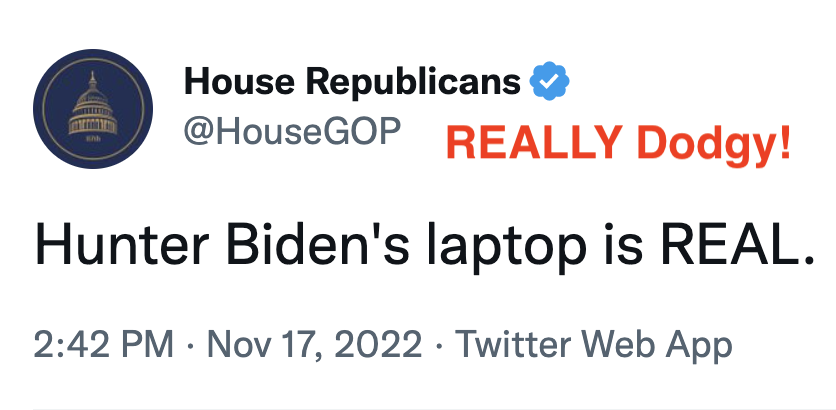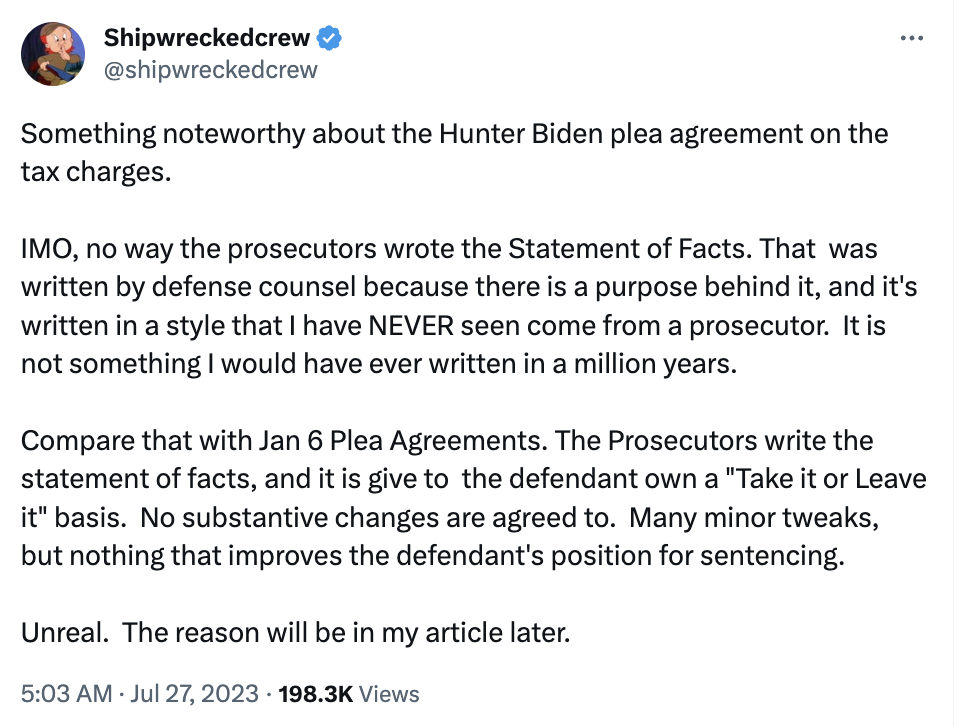In Hunter Biden Case, Abbe Lowell Enters His Appearance
In Hunter Biden’s filing responding to David Weiss’ motion to vacate Judge Maryellen Noreika’s order for more briefing on the form of the plea deal, Abbe Lowell signed the response, pending his entry of appearance.
His appearance is as significant as what appears inside the response filing.
Chris Clark, who had been leading Hunter Biden’s team for years, is a very good lawyer and had been quite accommodating with the prosecution, even deferring on issues of discovery in the plea hearing he might not have otherwise, given the things the IRS Agents had disclosed about undue influence and Sixth Amendment problems with the case between the filing of the deal and the plea hearing. Lawyers often will do that to maintain cordiality to help craft a plea deal.
Abbe Lowell — who led Jared Kushner through the Mueller investigation unscathed, and got Robert Menendez acquitted, and got the Tom Barrack aide charged alongside him in a FARA case acquitted — is something else entirely.
I fully expect Weiss to do some outrageous things with his new Special Counsel status. Prosecutors always have a lot of tools, and Merrick Garland unwisely just gave Weiss more tools, including the impunity to engage in abuses like John Durham did.
But Lowell’s appearance and this filing — which asserts that the government “renege[d] on the previously agreed-upon Plea Agreement” — both implicitly and explicitly signal that Hunter’s team will take a far more confrontational view with prosecutors going forward.
As part of that, the Hunter filing makes clear they intend to hold Weiss to the already-signed diversion agreement on the gun charge. Hunter’s team filed it, per Noreika’s order — signed by both the prosecution and defense — on August 2.
The Defendant’s understanding of the scope of immunity agreed to by the United States was and is based on the express written terms of the Diversion Agreement. His understanding of the scope of immunity agreed to by the United States is also corroborated by prosecutors’ contemporaneous written and oral communications during the plea negotiations.
Fourth, the Defendant intends to abide by the terms of the Diversion Agreement that was executed at the July 26 hearing by the Defendant, his counsel, and the United States, and concurs with the statements the Government made during the July 26 hearing,1 and which the Government then acknowledged in its filings agreeing to the public disclosure of the Plea and Diversion Agreements2 —that the parties have a valid and binding bilateral Diversion Agreement.
1 The Government stated in open court that the Diversion Agreement was a “bilateral agreement between the parties” that “stand[s] alone” from the Plea Agreement, and that it was “in effect” and “binding.” (Hr’g Tr. 46:9–14) (Government: “Your Honor, I believe that this is a bilateral agreement between the parties that the parties view in their best interest.”); id. at 91:6–8 (Government: “Your Honor, the Diversion Agreement is a contract between the parties so it’s in effect until it’s either breached or a determination [sic], period.”); id. at 41:12–15 (“Your Honor, the United States[’] position is that the agreements stand alone by their own terms … ”); id. at 89:12–14 (Government: “[T]he statement by counsel is obviously as Your Honor acknowledged a modification of this provision, and that we believe is binding.”).
2 (D.I. 24 in No. 23-mj-00274-MN); (D.I. 20 in No. 23-cr-00061-MN) (stating that the Diversion Agreement was a “contract[] between the Government and a defendant” and that Government assented to public filing because “the Government and the Defendant expressly agreed that this diversion agreement would be public”).
If Noreika upholds the diversion, it not only avoids a felony on the gun charge itself, but a false statement charge that prosecutors told Noreika they waived filing as well. It would take one piece of leverage Weiss had off the table.
If she upholds the diversion, that leaves the tax and any FARA (or related) charges, and potentially an attempt to go after Hunter’s benefactor, Kevin Morris (though once DOJ charges Hunter, he will have the ability to start a legal defense fund that will be opaque to regulators).
As the filing notes and as Lowell noted in a relentless Face the Nation appearance yesterday: The prosecutors were the ones who approached Hunter’s team — in May, the same month the IRS removed Gary Shapley’s entire IRS team from the case — to make a deal to avoid trial. [my emphasis]
First, in May 2023, the Defendant, through counsel, accepted the prosecutors’ invitation to engage in settlement discussions that the Defendant and counsel understood would fully resolve the Government’s sprawling five-year investigation.
Second, as is customary in negotiated resolutions, prosecutors (and not the Defendant or his counsel) proposed and largely dictated the form and content of the Plea and Diversion Agreements. This is true with respect to the form in which the documents were presented to the Court (i.e., as two separate and independent agreements), as well as the express language of paragraph 15 of the Diversion Agreement (the so-called immunity provision). Throughout the settlement process the Defendant and his counsel negotiated fairly and in good faith with the prosecutors.
Third, consistent with their terms, the Defendant signed both agreements, was willing to waive certain rights, and to accept responsibility for his past mistakes. As was required as part of the Plea Agreement, he was prepared to plead guilty to the two misdemeanor tax charges in open court and he truthfully answered Your Honor’s questions, including those regarding his understanding of the promises that had been made to him by the prosecutors in exchange for a guilty plea. The Defendant’s understanding of the scope of immunity agreed to by the United States was and is based on the express written terms of the Diversion Agreement. His understanding of the scope of immunity agreed to by the United States is also corroborated by prosecutors’ contemporaneous written and oral communications during the plea negotiations. [my emphasis]
Part of that is just bluster. As Lowell noted on FTN, obviously Hunter wanted to avoid trial, too. The reasons why Hunter would want to avoid trial, though, are all obvious.
But the press has shown zero curiosity about why Weiss’ team would have wanted to avoid a trial, even after Joseph Ziegler explained some of what that was.
And when asked whether there will be trial, Lowell reminded that now there’ll be discovery and motions and maybe the prosecutors will decide they want to avoid a prosecution in the end too.
MARGARET BRENNAN: The US Attorney said, due to this impasse, a trial is in order. Is a trial going to happen? Can you avoid one?
LOWELL: Well, the answer to the second question is you can but let me answer the first question. When you do not have a resolution and somebody pleads not guilty, as Hunter did, then two things happen. A judge put together a scheduling order, the end of which would be a trial. There’d be discovery and motions, etc. So that’s why that statement was made.
MARGARET BRENNAN: So it’s not inevitable?
LOWELL: It’s not inevitable. And I think what–
MARGARET BRENNAN: And you’re trying to avoid one?
LOWELL: Yes, we were trying to avoid one all along. And so were the prosecutors who came forward to us, and we’re the ones to say, “can there be a resolution short of a prosecution?” So they wanted it and maybe they still do want it. [my emphasis]
Even as noting that a prosecution would entail discovery and motions, Lowell noted that the only explanation for DOJ reneging on the plea agreement was if something besides the facts and the law had infected the process.
MARGARET BRENNAN: So let’s start with why this plea deal hit the impasse.
LOWELL: So if you were in court or read about what happened on July the 26th, you have to ask yourself, as you just asked me, “why?” And there are only a few possibilities. Remember, it were the prosecutors who came forward and asked if there was a resolution possible. They’re in charge of figuring out the form, the document, and the language. They did that. And so the possibilities are only, one, they wrote something and weren’t clear what they meant. Two, they knew what they meant, and misstated it to counsel. Or third, they changed their view as they were standing in court in Delaware. So to answer that question, I’ll ask you a question. And everybody else who’s paying attention, what group of experienced defense lawyers would allow their client to plead guilty to a misdemeanor on a Monday, keeping in mind that they knew that there could be a felony charge on a Wednesday? That wouldn’t happen.
[snip]
LOWELL: –Because I know we were a little rushed. So to answer your question squarely. People should keep in mind that while Mr. Weiss’ title changed last week, he’s the same person he’s been for the last five years. He’s a Republican U.S. attorney appointed by a Republican president and attorney general, who had career prosecutors working this case for five years, looking at every transaction that Hunter was involved in. So whether it was tax or the gun, or possible any other charge, if anything changes from his conclusion, which was two tax misdemeanors, and a diverted gun charge. The question should be asked: what infected the process that was not the facts and the law?
MARGARET BRENNAN: Or new evidence? I mean, are you confident your client won’t face new criminal charges?
LOWELL: I’m confident that if this prosecutor does what has been done for the last five years, look at the facts, the evidence and the law, then the only conclusion can be what the conclusion was on July 26. It’s new evidence, there’s no new evidence to be found. Some of these transactions are years old. They’ve had people in the Grand Jury, they’ve had data that was provided to them. I don’t know the possibility exists after this kind of painstaking investigation for them to be “oh, my gosh, there’s a new piece of evidence which changes.” The only thing that will change is the scrutiny on some of the charges, for example, the gun charge.
Already, Ziegler, who did nothing as he obtained one after another piece of evidence that people were hijacking Hunter Biden’s digital identity, revealed that there is documentation of undue influence on this prosecution in the case file. And now Lowell is suggesting that the only explanation for any change in Weiss’ posture from May would reflect similar undue political influence on the case.
And that’s the kind of thing that might make motions and discovery more painful for Weiss than the press currently understands.



